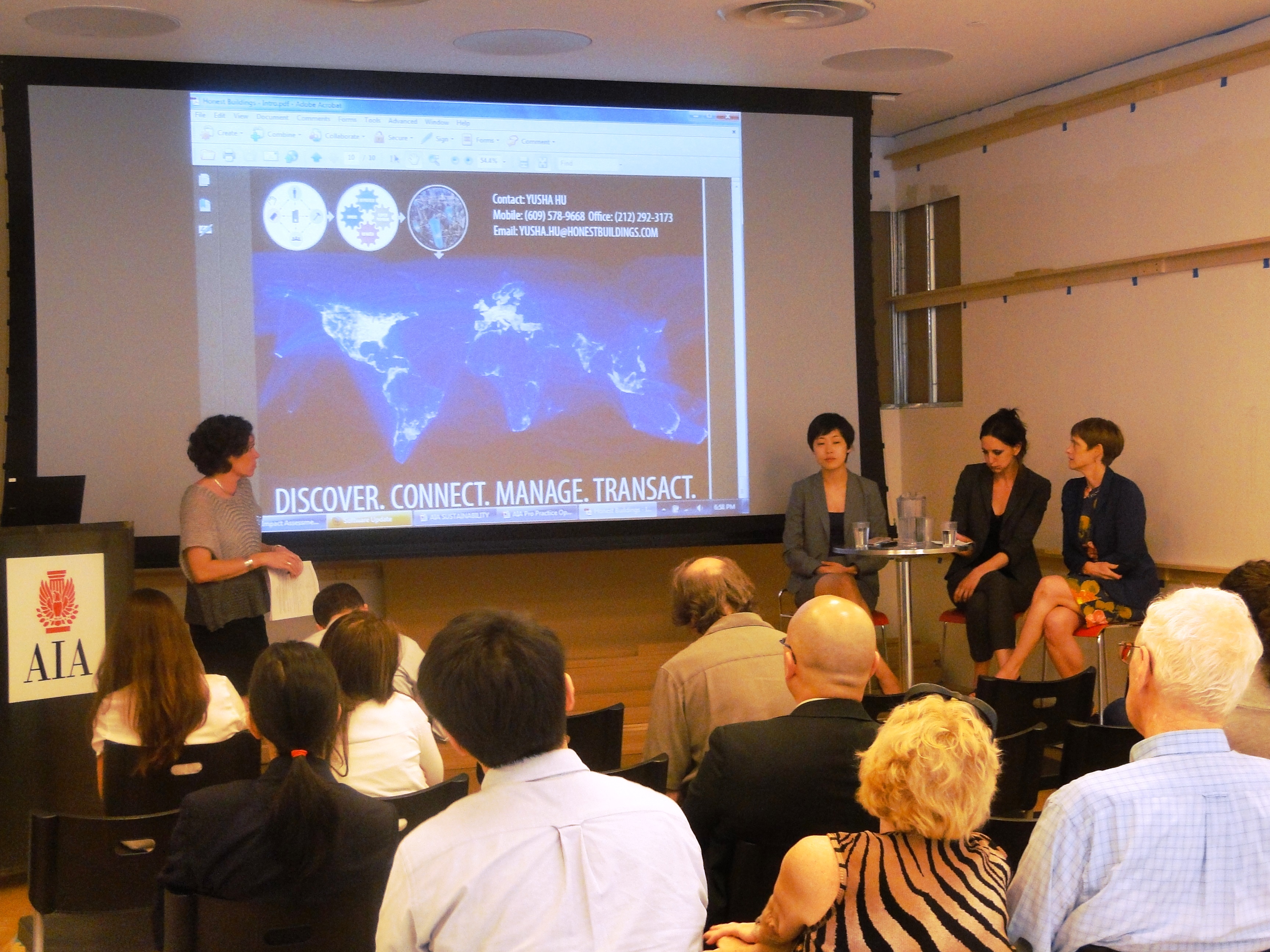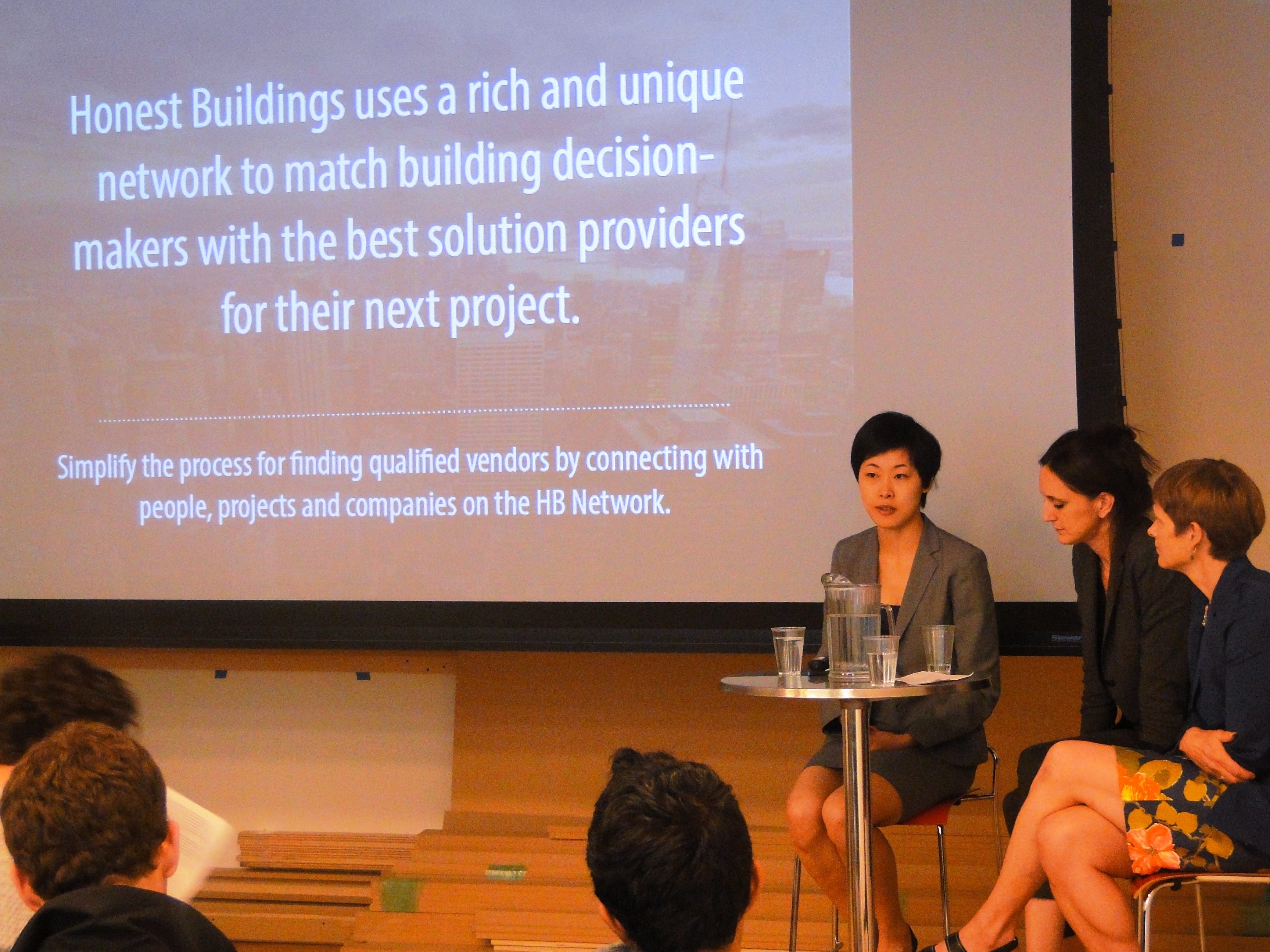by: Melissa Marsh
On 06.06.14, the AIANY Professional Practice Committee convened the penultimate session of the “Leading Architecture in a Changing World” series. A nascent theme of this session was that although architects focus on the sustainability – primarily energy consumption – of the buildings we design, we may not be as attentive to sustainable business practices for ourselves and our clients. To focus our attention on this matter, each panelist brought a fresh perspective to the topics at the intersection of sustainable buildings and sustainable business practice. An expert from the building industry was joined by an expert from the emerging “digital” building world and a leader in sustainable business evaluation.
After a short introduction, the panel kicked off with Fiona Cousins. Educated as an engineer, Cousins now leads sustainable consulting and building design teams as a principal in Arup’s New York office. She also recently authored Two Degrees: The Built Environment and Our Changing Climate. Cousins began with reflections on her career, in which she has taken a broad interpretation of sustainable design. In building projects she rarely considers just energy use, frequently focusing on water and natural resources protection, building functionality and durability, and the health and welfare of occupants. Noting the diversity of project work at Arup and the organization’s high regard in sustainable engineering solutions, her nearly 25-year career has not felt like a single job, but rather a wide range of opportunities to improve the built environment.
Cousins observed that for cities like New York, some aspects of the building code are becoming suitably stringent in order to move closer to LEED-inspired standards. She also suggested that as building systems become more efficient, and there are fewer differences between products, there are opportunities for greater performance differentiation to come from the design and interrelationship of people with the design. An example of this is recent work with the InterContintental Hotels Group, in which the most powerful changes were operational and organizational.
The next conversation was guided by Sophie Faris, who leads community development at B Lab, the non-profit behind B Corporation Certification and Benefit Corporation Legislation. Faris introduced the B Corp concept: a certified business designation that enables companies to declare their commitment to sustainability and deliver on these commitments. B Corp, or Benefit Corporation, has been adopted as an option for incorporation in 12 U.S. states, and is being considered in 17 more states, providing a model for embedded sustainability for businesses across the country.
The self-appraisal process – which is later audited – helps companies to review issues of corporate governance, worker compensation and satisfaction, community development, supply chain issues, and energy use. B Lab, she explained, sets rigorous standards for social and environmental performance, and its accountability and transparency help guide companies towards meeting those targets.
These organizations take a so-called “triple bottom line” approach to their business, considering environmental and societal impacts right alongside financial benefits. Measuring business success by more than just profit alone results in differentiation, investor attraction, improved benchmark performance, talent engagement, cost savings, and better public relations.
With a background in finance, sustainability and operations, the third speaker Yusha Hu leads global market development for Honest Buildings, a New York City-based startup that aims to connect building industry professionals with customers. As Hu explained, her company is a web platform primarily focused on creating a transparent, crowd-sourced method of accessing better information about the built world and service providers in the marketplace. One of the core features of Honest Buildings, called HB Match, is a means by which teams may be assembled and building industry members with building-specific experience can be matched. In the time between the event and this publication, Honest Buildings announced that it successfully raised $5.5 million in Series A venture funding.
Following the speakers’ remarks, the audience interaction and conversation turned to exploring topics such as the role of technology and building performance modeling in sustainable design solutions. In addition, the discussion explored the relationships between occupant behavior and sustainable design with particular regard to telecommuting, transportation, and paper-waste reduction. There were also some inquiries and reflections on the AIA 2030 Commitment, which was recently reviewed in a 2012 progress report.
In a conversation following the event, Cousins also quietly confessed that this was the first time that she had been a part of an all-female panel. It was an interesting point in this context, since when considering the full scope of sustainability – which includes corporate social responsibility – professional diversity is an important metric. This is a clear opportunity for a future Professional Practice program.
Melissa Marsh is a workplace strategy and change management consultant with an architectural education. She recently founded her own company, Plastarc, Inc.. She is regular contributor to e-Oculus focusing on topics relating to design research, business practice, and next generation professionals, and can be reached at melissa@plastarc.com.
Event: Leading Architecture in a Changing World Series: Beyond Buildings: Sustainable Business Practices
Location: Center for Architecture, 06.03.13
Speaker: Fiona Cousins, Principal, ARUP, and author of Two Degrees: The Built Environment and Our Changing Climate; Sophie Faris, Community Development Leader, B-Lab; Yusha Hu, Director, Honest Buildings
Organizers: AIANY Chapter Professional Practice Committee and AIANY staff









